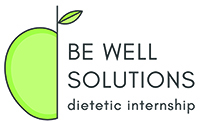In a distance dietetic internship the intern has the opportunity to identify preceptors and set up their rotations. As a courtesy, we will provide some assistance in securing rotations to interns who have matched with BWS DI. The BWS DI encourages interns to complete the clinical rotation early in their internship year to provide them with the confidence and knowledge necessary to excel in subsequent rotations. When building a schedule, it is helpful to schedule rotations that build on previous skills.
When searching for potential rotation sites, a good place to start is your local chapter of the Academy of Nutrition and Dietetics. Become a student member and reach out to RDNs in your area to establish connections. Utilize LinkedIn to find dietitians in your geographic area. Reach out to previous interns and advisers if you need help getting started finding contacts. Reach out to family and friends who are professionals in a health care setting. Try to network in the community as much as you can. It is helpful to reach out to nutrition managers and other RDN’s in various organizations and agencies. Make sure the preceptor’s needs and expectations fulfill the required hours and objectives.
Options for Site Selection
Clinical Rotation (480 hours)
When scheduling a clinical rotation, your primary preceptor must be a registered dietitian. Any clinical dietitian practicing Medical Nutrition Therapy is acceptable for supervised practice experience in a clinical setting. Try to find a facility that utilizes the nutrition care process and ADIME notes, PES statements, and/or other electronic charting creating nutrition care plans. The facility should allow direct interaction with patients and other members of a multi-disciplinary, inter-professional health care team.
Options may include, but are not limited to:
- Community hospitals
- Medical centers
- Long-term care facilities
- Sub-acute facilities that include sub-acute beds
Community/Public Health Rotation (160 hours)
It is important to develop skills such as communication, research, writing, assessment, counseling, public speaking, management, and being a part of an interdisciplinary team. The community and public health rotation is a good way to harness a variety of skills needed as an RDN. It is helpful if you can find resources to learn grant writing, involvement in public policy and legislation, if possible. During this rotation it is strongly preferred that the preceptor is a registered dietitian. Site options include community settings that focus on wellness and disease prevention.
Example rotation sites include, but are not limited to:
- WIC
- Public Health Departments
- State / County Departments of Health
- American Heart Association
- American Cancer Society
- Cardiac Rehabilitation Center
- Eating Disorders Clinic
- Fitness / Athletic Club
- Food Nutrition Consulting
- Food Bank
- Grocery / Supermarket
- Head Start Program
- Health Care Foodservice
- Health-related Children’s Camp
- Meals on Wheels
- Mental Health Facility/Service
- Military Field Operations
- Non-profit Health Related Agency
- Office for Aging
- Pediatric-based Program / Clinic
- Rehabilitation Center
- Renal Dialysis Outpatient Center
- Senior Citizen Program
- State / Federal Agency or Task Force
Foodservice Management Rotation (80 hours)
The foodservice management rotation should provide the intern with a variety of experiences including communication, budget development, quality assurance and monitoring, menu and recipe development, menu analysis, menu cost, exposure to foodservice equipment, as well as sanitation and safety procedures. It is strongly preferred that the preceptor is a registered dietitian.
Example rotation sites include, but are not limited to:
- Hospital / Medical Center
- Long Term Care / Subacute clinical Foodservice
- College / university dining services
- School food service
Wellness rotation (320 hours)
The wellness rotation should give the intern skills in communication, an overall understanding of health and wellness, social marketing, management, strategic planning, and development of public educational materials. The wellness aspect should focus on disease prevention. It is strongly preferred that the preceptor is a registered dietitian.
Example rotation sites include, but are not limited to:
- Corporate wellness companies such as Be Well Solutions
- Companies with established wellness programs
- Insurance companies with a focus on preventative wellness
- Employee assistance programs (EAP)
- Benefits brokers providing wellness services and guidance to clients
Emphasis rotation (160 hours)
The emphasis rotation is meant to be a time during which the intern can focus on a special experience customized to their needs. Interns may choose to explore an area of interest to broaden knowledge base and skills. It is strongly preferred that the primary preceptor is a registered dietitian.
You may use this rotation to gain experience in pediatrics, sports nutrition, the private practice sector, outpatient counseling, diabetes management, or any other are of interest to you. You may also extend a previous rotation for more in-depth experience in that area.
For more information regarding securing rotations or preceptors, see the ACEND website.
